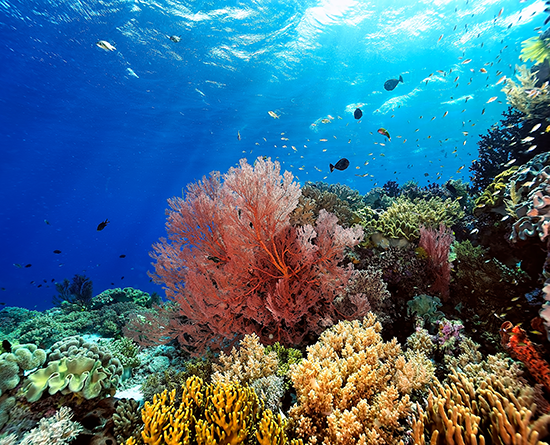Advancing EcoTech marine's products for monitoring aquariums and coral reefs
Sabrina Jedlicka
Jul 24, 2025

Coral reefs cover just 0.1% of the earth’s ocean area, yet support up to 25% of global marine life. This remarkable biodiversity is driven by coral polyps—tiny aquatic animals related to jellyfish and sea anemones—that form reef structures by clustering into colonies. These colonies are held together by their hard, calcium carbonate exoskeletons, creating reefs that can grow in various configurations and sizes, some stretching over 1,000 feet.
Reefs contribute to the formation of new islands and atolls while providing a home to marine biodiversity, including fish, mollusks, sponges, and crustaceans. They also support human economies by attracting tourists, providing crops for fisheries, protecting shorelines, and minimizing damage from coastal erosion and storms. Globally, reefs generate an estimated $375 billion in economic benefits annually.
Unfortunately, reefs have been in decline since the 1950s. Their healthy existence is threatened by factors such as acidification caused by rising temperatures, overfishing (which unbalances the reef ecosystem), and harmful sediment and chemical runoff from land. Researchers are exploring ways to restore reef health, including partnering with hobbyist aquarists, known as “reef keepers.”
Reefkeeping is the practice of maintaining living, small-scale reefs in tanks with carefully maintained temperatures, water flow, and other aquatic conditions. This hobby requires substantial time, knowledge, and equipment to replicate a coral reef system. Reef keepers must reinforce their home flooring and upgrade electrical systems to maintain saltwater tanks that support various marine life—often a lifetime commitment.
EcoTech Marine (Bethleham, PA) is a leader in hobbyist aquarium equipment. From lights to flow devices, its products are recommended by supersized coral suppliers, such as CCW in Orlando, FL, and ubiquitous in reefkeeping magazines. Tim Marks and Patrick Clasen, two of EcoTech’s leadership team members, earned undergraduate and graduate degrees from Lehigh and maintain a longstanding research relationship with their alma mater.
Supported by PITA, EcoTech partnered with Lehigh University to investigate automating the calibration of foam fractional units used for nutrient management in closed reef systems. The project is led by Sabrina Jedlicka, Deputy Provost of Graduate Education and associate professor of bioengineering and materials science and engineering at Lehigh University. The research team includes co-PI Susan Perry, Assistant Dean of Academic Affairs and professor of practice in bioengineering, along with graduate and undergraduate students from Lehigh.
In this project, the research team sought to develop a probe capable of detecting excess nutrients in the water, ultimately improving protein skimmers used by aquarium hobbyists. The “foam fractional” process uses bubbles to separate substances based on molecular differences, enhancing water quality in closed systems like aquariums, and simplifying system maintenance.
Jedlicka tested probe materials for use in the sensor probe, trying stainless steel, carbon fiber, and titanium probes. The choice of material hinged on its ability to differentiate water from skimmate bubbles based on electrical conductivity. In Jedlicka’s tests, titanium emerged as the winner. Long-term testing in an aquarium showed that the probe can generate consistent results for 120 hours, or about five days, maintenance-free. The research team plans further refinements, including transitioning a printed circuit board and determining manufacturing standards for the titanium probes.
The resulting product is designed to make reef keepers' lives easier and their corals healthier. It may also provide scientists studying ocean marine health with more possibilities and research pathways to improving the global health of coral reefs. Additionally, the project gave participating students hands-on experience working with an industry partner.
“This work supported several students, including two senior capstone design projects and a master's student in mechanical engineering,” says Jedlicka. “The education that the teams and graduate students gained from the experience spurred interest in the hobby, but also interest in ocean sustainability.”
EcoTech Marine is an example of homegrown manufacturing and talent with a global reach. The EcoTech Marine–Lehigh University partnership is a model of academics and businesses working together to innovate for aquarium hobbyists and the health of coral reefs worldwide.
